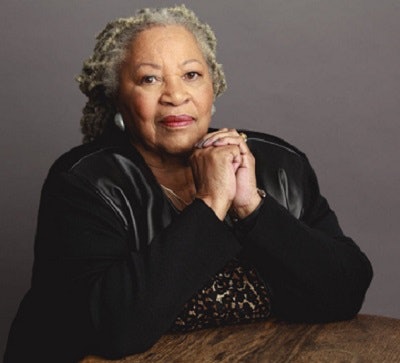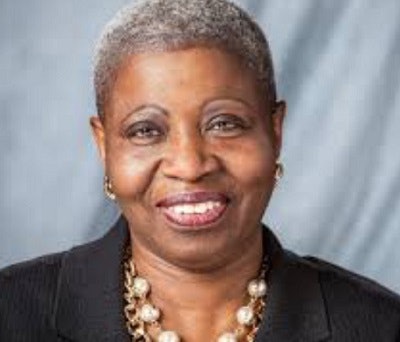 Toni Morrison
Toni MorrisonThe grief in Dr. Eddie S. Glaude Jr.’s voice was unmistakable as he spoke of author and educator Toni Morrison, one of America’s towering literary figures whose words leaped from pages into hearts, minds and souls of readers around the world.
Morrison, who died Monday evening at the age of 88, now belongs to the ages. Left to mourn her are not just family and friends, but innumerable lovers of literature, scholars and teachers captivated and influenced by her soaring prose, her way with words and her brilliant cultural consciousness.
Her passing, for many, has had the same effect as her writing – it could leave you at a loss for words.
“The power of her intellect, the way in which she marshalled language and her overall – how can I put it?” asked Glaude, the James S. McDonnell Distinguished University Professor of African American Studies at Princeton University, where Morrison taught from 1989 to 2006 and chaired the humanities department.
“She was unabashedly Black,” he declared. “And not in an ideological sense. She just occupied her space without qualification. And it was a beautiful example.”
Morrison was born Chloe Ardelia Wofford in Lorain, Ohio. An avid reader and lover of the arts at an early age, she became involved in the drama club, debate team and yearbook staff in high school. She earned a bachelor’s degree in English at Howard University and a master of arts degree in English at Cornell University.
Before writing novels that eventually made her a world-renowned author, Morrison worked as an editor at Random House for nearly two decades. She was the fiction department’s first Black woman senior editor and opened doors for emerging Black writers such as Angela Davis and Gayl Jones.
Morrison ultimately penned 11 novels, from The Bluest Eye in 1970 to God Help the Child in 2015. Her best-selling novel, Beloved, won an American Book Award and a Pulitzer Prize for fiction in 1988. It was adapted a decade later into a movie starring Oprah Winfrey and Danny Glover, grossing nearly $23 million at the box office and earning an Academy Award nomination for costume.
 Dr. Eddie S. Glaude Jr.
Dr. Eddie S. Glaude Jr.She was the first Black woman to win a Nobel Prize in literature and received numerous national honors over the course of her career. President Barack Obama presented her with the Presidential Medal of Freedom in 2012, and she received the PEN/Saul Bellow Award for Achievement in American Fiction in 2016.
At Princeton, Morrison taught creative writing and held the Robert F. Goheen Chair in the Humanities until retiring in 2006. Last year, the Ivy League institution changed the name of West College to Morrison Hall in her honor.
Glaude remembers first meeting Morrison when he was a graduate student at Princeton in the early ’90s and frequented Dickinson Hall, where the African-American studies department and her office were located.
Since becoming a professor himself, he has routinely used Beloved in his teaching curriculum and has watched students marvel at Morrison’s gift of storytelling.
“Her work and that particular novel have been at the heart of my thinking,” he said. “The way I re-read American pragmatism, Beloved is at the heart of it – unflinching recognition of the reality of evil, but the necessity to act in the face of it.”
“It’s hard,” he said of her passing. “We’re losing giants at a time where it seems like we need their shoulders.”
His wasn’t the only heavy heart across academia as word spread Tuesday that Morrison had passed.
Dr. Angelyn Mitchell, associate professor in the English department at Georgetown University, recalls how “incredibly gracious” Morrison was at conferences and in academic settings.
“When she was in the audience and I was delivering a paper,” Mitchell said, “I was incredibly nervous because how often does that happen?”
While some can single out a favorite Morrison work, Mitchell cannot.
“It depends on where I am in my life, which is what makes her work so powerful,” she said. “Each time we return to her work, we return to ourselves. I think that was the beauty of it, that she gave us a way of thinking about our humanity.”
To fully appreciate Morrison, you have to read her nonfiction as well as her fiction, said Dr. Marilyn Mobley, professor of English and African American Studies at Case Western Reserve University and a founding member and former president of the Toni Morrison Society.
The society, based at Oberlin College, is a community of Morrison scholars and readers established in 1993, just months before Morrison won the Nobel Prize.
 Dr. Marilyn Mobley
Dr. Marilyn MobleyWhile Morrison’s novels never fail to captivate, some regard them as a heavy lift because her play with language, point of view and narrative engage the intellect as well as the imagination, compelling readers to question assumptions and think more broadly and deeply.
“Some say it’s hard to stay with the story,” said Mobley. “But in the end, she has taken you somewhere you needed to go and you didn’t even know you needed to go there. But you learn something and are glad you went.”
From novels to essays to her Nobel address, nothing Morrison scripted was bereft of culture and humanity, Mobley observed.
“She cared about race and social justice, and she cared about our humanity,” said Mobley. “And she wrote about that better than anybody else.”
Many suggest that to refer to what Morrison did merely as writing would be to greatly diminish her literary artistry.
Like no other, Morrison was “a masterful and genius writer, book editor and intellectual whose legacies are both intergenerational and indelible,” said Dr. Trimiko Melancon, associate professor of English, African American studies and women’s studies and director of African and African American studies at Loyola University.
“What she did with words and language — how she embraced and touched us all — is deeply arresting, undeniably unprecedented and profoundly indescribable,” said Melancon. “She wrote about Black people, centering our experiences with intimacy and complexity, when doing so in literature was deemed unpopular, inconvenient, even unwarranted. Yet, she did so while also drawing on larger dynamics, speaking powerfully to the complexities of the human condition.
“This was what made her work simultaneously Black and universal, particular and global. With every word, at every turn, Morrison disrupted the master narrative. She challenged the validity and exclusivity of a myopic American literary canon. And, equally consequential, she elevated and liberated not only the word — making it deeply visceral, personal, communal and felt — but she also liberated us. How fortunate we all are to have lived and to have been gifted Morrison during our lifetime.”
Dr. Joanne Gabbin, a literary critic and executive director of the Furious Flower Poetry Center at James Madison University, remembered Morrison as a friend and “the most important writer of the last 50 years.”
While Gabbin says Morrison rarely told easy stories about the Black experience and little Brown girls in search of themselves and beauty, they were luminous and the language, lyrical.
“Toni could mesmerize you with her voice and the words she wrote,” said Gabbin, who taught the only course at JMU devoted to Morrison’s work. “I believed so much in her writing. We studied everything that she wrote.”
 Nikki Giovanni
Nikki GiovanniInternationally celebrated poet Nikki Giovanni remembers the day 40 years ago when, as a poet living in New York City, she read The Bluest Eye and determined that she had to meet Morrison.
So, she made her way to Random House and prevailed on a security guard and a receptionist to get her on the phone with Morrison. Morrison took the call, said she had read some of Giovanni’s poetry, came down and the two had coffee at a spot nearby.
That was the beginning of a friendship that would endure decades, said Giovanni.
Morrison helped her as she grieved the death of her mother. When Giovanni, in the depths of sorrow, asked Morrison what she should do – if she should “drink” – Morrison advised her to write, instead.
“And I have been writing since,” said Giovanni, a University Distinguished Professor of English at Virginia Tech, where she has taught poetry since 1987.
Because both women had not been feeling well, they had not seen each other for a while, although they exchanged notes, Giovanni said. Giovanni recently thought about getting some fish and visiting Morrison at her home on the Hudson River to fry it and enjoy it together. And she dreamt about her friend just days before her death.
“I’m sure going to miss her,” said Giovanni, who hosted a 2012 event at Virginia Tech to celebrate Morrison that drew 5,000 guests, including Maya Angelou and Rita Dove.
Mitchell echoed the sentiments expressed by heart-broken colleagues – many of them personal friends of Morrison – that her death is “a very sad day for American culture.”
“Not only was she a novelist, but a public intellectual and one of our premiere thinkers,” said Mitchell. “Her reach is so far. Her work will continue on through the many writers that she has inspired, through the many scholars she has inspired, through the many readers she has inspired. That gives us solace through this moment.
“We will miss her. I know that there are many who already miss her because of her impact, but her legacy lives on and her words, and for that we are very fortunate.”















